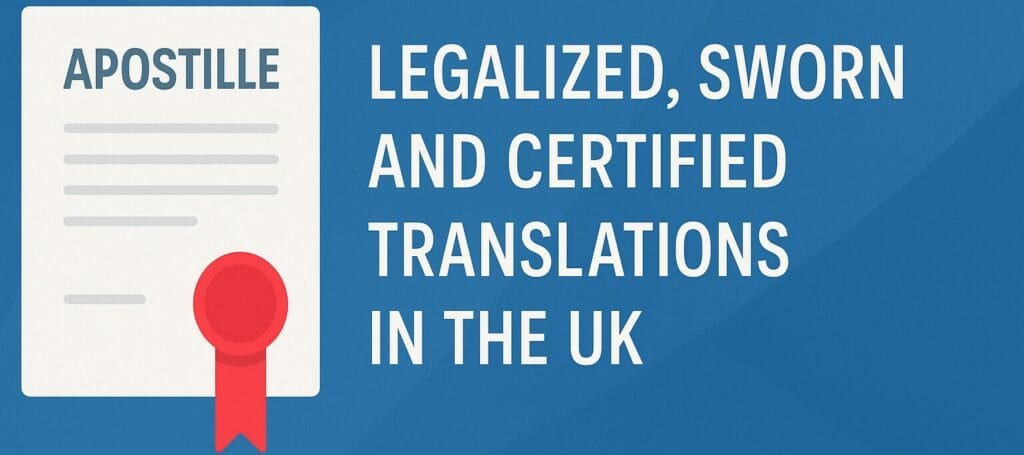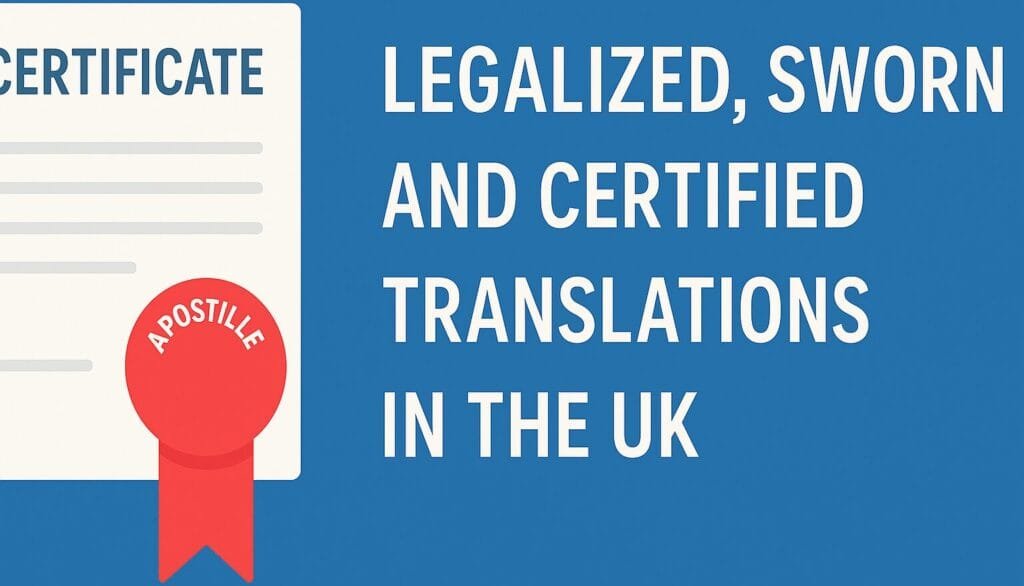Legalised, Sworn and Certified Translations in the UK
When dealing with international legal, academic, or personal matters, you may be asked for a legalised translation, a sworn translation, or even a document certified by the FCDO legalisation office (formerly FCO). The differences between these terms can cause confusion, especially since the UK does not have an official “sworn translator” system.
This guide explains everything you need to know about legalisation, certified translation, sworn translation, notarisation, and apostille de Haya — so you can make sure your documents are accepted worldwide.
👉 “At Best Language Services, we specialise in legalised, sworn and certified translations in the UK, ensuring your documents are prepared to meet international requirements.”

What is Legalisation?
Legalisation is the process of proving that a document issued in the UK is genuine. This is usually done with an apostille certificate (known internationally as the apostille de Haya) issued by the FCDO legalisation office.
Legalisation is often required for:
Birth, marriage, and death certificates
Court orders and affidavits
Educational diplomas and transcripts
Company documents for business abroad
By legalising your documents, foreign authorities can confirm they are authentic and valid.
Certified Translation in the UK
A certified translation confirms that a translation is accurate and complete. In the UK, this is normally provided with a Statement of Truth or Certificate of Accuracy, signed by the translation provider on company letterhead.
Best Language Services Ltd (BLS), an Accredited Member of the Association of Translation Companies (ATC) and a Member of the Institute of Translation and Interpreting (ITI), issues certified translations suitable for submission to UK authorities, courts, and embassies.
👉 “Our team provides fast and reliable legalised, sworn and certified translations in the UK, trusted by embassies, government bodies, and courts.”
Sworn Translation (For Use Abroad)
Unlike the UK, many European countries (such as Spain, France, Germany, Italy, and Portugal) require translations carried out by an official sworn translator.
Spanish Sworn Translation: For immigration, court, and notarial use in Spain.
French Sworn Translation: Accepted by French ministries and courts.
German Sworn Translation: Required for academic, business, and legal filings.
Italian Sworn Translation: Necessary for notarial acts, contracts, and university admissions.
Portuguese Sworn Translation: Commonly needed for court submissions and residency applications.
BLS works with in-country sworn translators to ensure your translation is valid where you need it.
Notarised Translations
A notarised translation involves a Notary Public. Once the translation is completed, the translator or agency makes a declaration under oath that the translation is accurate. The Notary then signs and stamps the document with their official seal.
Notarised translations are often requested for:
Property purchases
International banking or financial transactions
High-value legal agreements
Legalisation by the FCDO (Apostille)
The apostille de Haya was introduced under the Hague Convention of 1961 to simplify the recognition of documents across borders.
In the UK, the FCDO legalisation office (previously the FCO) issues apostilles. This legalisation may be required after your translation has been certified or notarised.
Once legalised, your document will be recognised abroad without further verification.
Translation Legalisation Abroad
Some countries only accept translations completed by sworn translators registered in their jurisdiction. Thanks to our international network, BLS can provide in-country sworn translations in over 100 languages.
This ensures compliance with local requirements and avoids delays when presenting documents overseas.
Why Choose Best Language Services Ltd?
Accredited Member of the Association of Translation Companies (ATC)
Member of the Institute of Translation and Interpreting (ITI)
Certified to ISO 9001 quality standard
Accepted by UK courts, the Home Office, universities, and embassies worldwide
Access to sworn translators in Spain, France, Germany, Italy, and Portugal
Over a decade of experience serving law firms, businesses, and private clients
Frequently Asked Questions
1. What’s the difference between a certified and a sworn translation?
A certified translation in the UK comes with a statement of truth from a translation company. A sworn translation is required in certain countries (like Spain or France) and can only be provided by an officially authorised translator there.
2. Do I need legalisation (apostille) as well as translation?
Yes, often both are required. Legalisation confirms your original document is genuine, while certified or sworn translation makes it usable abroad.
3. Can BLS handle both translation and legalisation?
Yes. We manage the full process: translation, notarisation (if required), and submission to the FCDO legalisation office for apostille.
👉 “Whether you need a legalised translation, a sworn translation, or a certified translation, BLS offers complete legalised, sworn and certified translations in the UK to suit every requirement.”
Get Your Documents Legalised and Translated Today
Best Language Services Ltd provides:
Certified Translations for UK authorities
Sworn Translations in Spanish, French, German, Italian, Portuguese and more
Notarised and Legalised Translations suitable for worldwide use
📞 Call us today on +44 33022 93993
📧 Email: [email protected]
Or click below to request your free quote:


